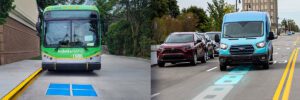
GM plans to import EV batteries from Chinese battery giant CATL. The arrangement is a temporary one, meant to tide GM over for a couple of years until it establishes its own domestic supply of lower-cost batteries made with lithium iron phosphate (LFP) chemistry, “a source familiar with the matter” told Reuters.
“For several years, other US automakers have depended on foreign suppliers for LFP battery sourcing and licensing. To stay competitive, GM will temporarily source these packs from similar suppliers to power our most affordable EV model,” GM said, obviously referring to the upcoming next-gen Chevrolet Bolt, which will use an LFP battery chemistry.
GM aims to establish LFP battery production in the US in 2027, and shortly thereafter to begin producing even cooler LMR (lithium-manganese-rich) prismatic cells.
Charged and just about everyone else in the EV industry has been sounding the alarm about Chinese dominance in battery materials, and the need to bring production to the US, for a decade. Automakers are now finally beginning to take steps in this direction, ironically in response to tariffs instituted by a staunchly anti-EV administration.
Still, as Reuters reports, automakers are continuing to import parts and full vehicles due to lower production costs or more advanced technology in “other countries” [ahem, ahem…China].
Ford is also using technology from CATL to make its battery cells. Ford feared that this would put the kibosh on federal production tax credits for its planned Michigan battery factory. However, the automaker now says it is “on track” to receive the tax credits under recently revised rules, and the Michigan LFP plant is expected to begin production in 2026.
Source: Reuters
from Charged EVs https://ift.tt/avo70e8



No comments:
Post a Comment